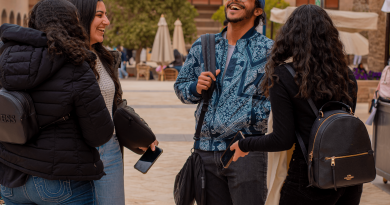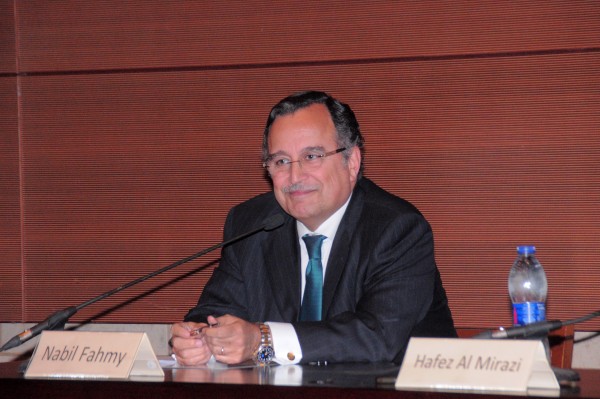Student Grassroots Campaign Fights Sexual Harassment
![New groups seek to make Egypt’s street safe for all women [Photo by: Kathrine Hojte]](http://www.auccaravan.com/wp-content/uploads/2014/05/Motorcykele2-e1399238184655.jpg)
In the absence of safety on the street, a new youth movement takes the initiative to turn the tide
BY ENGY ADHAM AND FARAH TAHA
Students from different high schools and universities have formed an advocacy group to help raise awareness of and take action against sexual harassment in Egypt.
Calling itself No Harassment, the group was founded by high school senior Ismael Abd Al Hady in 2013 after he saw how often women taking public transportation are sexually harassed.
“I am always using the metro, you can say that I know all of its routes by heart and I see what women face on the train and at the stations,” Abd Al Hady said.
His response was to establish an organization that sponsors self-defense workshops to train women on how to protect themselves in addition to holding awareness campaigns in various city districts.
“We want everyone to know who the students against harassment are and then join us to help out,” Abd Al Hady said.
Manal Alaa, a freshman at the Department of Archaeology at Ain Shams University, has been working as the marketing manager of the group and says No Harassment will continue to work for change until women feel safe walking alone “wherever [they] please”.
“We are now trying to communicate and cooperate with universities and other movements against sexual harassment, so that we can have a bigger group and help more people become aware of what is really happening in our country,” Alaa added.
The group, which also uses social media to publicize their movement and its activities, intensifies its campaigns during national holidays because that is traditionally when Egyptian streets are most crowded and when the risk of sexual harassment is at its peak.
In previous years, Egyptian media – such as Youm7 and AlMasry AlYoum – have published pictures and video of young men chasing girls during Eid and other holidays.
In November 2006, blogger Wael Abbas published video of mobs of men chasing girls in Tahrir Square during Eid Al Fitr.
The incident sent shock waves through Egyptian society.
AUC alumna and former publisher of the Daily News Egypt Mirette Mabrouk wrote of the incident at the time: “Women who were with their husbands, brothers or fathers were not spared. And nowhere, in the middle of this flagrant abuse of law and order and of common decency, was there any sign of an official or police response.”
In the absence of security, it is grassroots efforts by groups like No Harassment that are trying to make a difference in such situations.
During the Easter and Sham el Nessim break, No Harassment volunteers went to the Nasr City district around City Stars mall – which is usually crowded and bustling during the holidays – and talked to shoppers and passers-by about their initiatives.
They introduced their movement and why it is fighting sexual harassment and distributed flyers with poignant phrases such as “I don’t want to hate myself for being a girl”, which addresses the stigma of shame often felt by girls who have been harassed or violated.
Men and women who stop to listen are invited to join the group; women are also encouraged to attend some of the group’s sponsored workshops or self-defense classes.
“We started to teach girls self-defense at the British Council in Giza and we are still working on a lot more events in the streets,” said Alaa.
Salma El Shazli, a gold medalist in the Judo National Championship and a senior at the El Haram Secondary School for Girls, has been giving self-defense classes to young women, Alaa said.
The No Harassment group also gives tutorials on what girls can carry in their handbags that can deter harassers or attackers, such as needles, keys, pens, etc.
They also encourage anyone who has been sexually harassed to report the incident and never to be ashamed of the experience because the victim or survivor is not to blame.
Alaa believes that if the Egyptian government were to implement the proposed law against sexual harassment, it could prove effective in reducing the number of incidents in the country.
Egyptian media has recently been speculating about reports that the current cabinet is working on amending existing statutes to include a law which specifically focuses on sexual harassment.
The law suggests punishments that start with one to three years imprisonment for convicted harassers and fines beginning at EGP 10,000.
Adel Ramadan, a lawyer at the Egyptian initiative for personal rights told the Caravan that tightened punitive measures might seem like a sound approach to eradicate sexual harassment in Egypt but it has never been effective.
If the laws are too rigid, no one is likely to apply them, he said.
Since many of the offenders are as young as 12, prosecutors may balk at calling for a juvenile to be sentenced to three years for sexual harassment, he said.
Ramadan adds that the laws should be easy to implement and be inclusive of a wide range of cases.
In the meantime, No Harassment volunteers said they are working to increase their membership and widen their scope on school and university campuses.
“I think everybody must begin with themselves and improve their behavior and try to educate others about the harassment and prevent any harassment case that is about to happen,” said Alaa.
For the moment, No Harassment is on hiatus, said Abd Al Hady, as its members prepare for thannaweya a’ama high school examinations.
He says the group will hold high board elections in July and then proceed to campaign every week.
One particular area they intend on canvassing is the underground metro.



